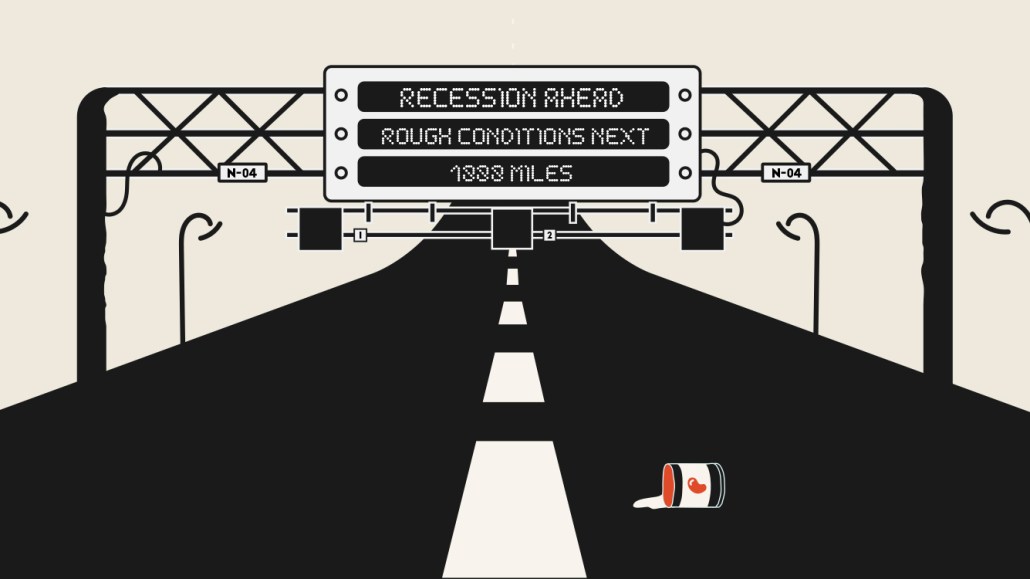Secure your place at the Digiday Publishing Summit in Vail, March 23-25
WARC’s spend predictions paint dire picture for 2023 advertising, especially social media

Whether you believe we are in a recession right now — and the National Bureau of Economic Research still hasn’t declared one — global research outfit WARC doesn’t see good times ahead for the advertising business in 2023.
WARC on Wednesday issued its ad spend outlook for 2022/2023, which backs up the positive results the agency holding companies have enjoyed so far this year — an 8.3 percent rise in global ad spend, amounting to $67.3 billion more spent this year over 2021.
Besides the positive first half of the year, 2022’s totals are buoyed by a strong political ad windfall in the U.S. and a revenue boost from soccer’s World Cup, to be held in Qatar starting Nov. 20 and running until a week before Christmas.
Essentially that’s where the good news ends. WARC’s projections for 2023, based on a review of data from 100 markets worldwide, show a much slower growth rate of only 2.6 percent reaching $903.8 billion. WARC cites a further economic slowdown, but more importantly sees a long-tail negative effect of Apple’s cookie-blocking moves as inhibiting the type of growth social media platforms have enjoyed for the last decade.
Specifically, the social media platforms are expected to lose about $40 billion of revenue opportunity between this year and next, as WARC’s report predicts social media will grow a very ordinary 5.2 percent in 2023, following a nearly 48 percent jump in 2021 and a more modest 11 percent this year. It’s the lowest growth forecast WARC has ever issued for social media.
Part of that softening is due to Meta’s Facebook expected 2023 results, which WARC predicts at -8.6 percent — only partially offset by corporate sibling Instagram’s expected 6.7 percent growth. Part of the reason for Facebook’s drop is WARC’s belief that small to medium businesses SMBs) will suffer disproportionately from economic challenges ahead.
Meanwhile, TikTok is forecast to continue its meteoric growth — 41.5 percent in 2023 — albeit slower than it’s enjoyed the last two years (143 percent in 2022 and 347 percent in 2021).
Agency holding companies are expected to reap the benefits of the strong first half of 2022 through their Q3 numbers but it’s unclear what full-year results will look like.
Mark Penn, CEO of Stagwell, a relatively new agency holding company that’s enjoyed strong results since its formation a year ago, was almost bemused by the dour forecast for next year, given how strong 2022 remains. “If an alien landed in my chair today, I don’t think he or she would see evidence of a recession,” said Penn. “We’re expecting robust growth through the end of the year, and consumer demand is just not slowing down from what we see for now.”
Similarly, Brian Wieser, global president of business intelligence for WPP’s GroupM, said he remains on track with his predicted 5.1 percent growth for 2023 for media spend. “Our baseline assumption is that there’s going to be a soft landing in the U.S.,” he said.
Wieser took a bit of issue with WARC’s logic on social media’s minimal growth, noting that just because Facebook might feel a drop in spending from SMBs doesn’t mean the whole category of social will feel the same effect. “In any given sector, there’s a relatively fixed pool of spending, based on a wide range of factors,” he said, adding that one platform’s losses would be offset by spending on other platforms.
As for the major ad categories, WARC predicts strong growth from technology/electronics (at 11.5 percent over 2022), pharmaceutical/healthcare (7.5 percent), nicotine products (also 7.5 percent) and non-profit/public sector/education (7.1 percent).
Surprisingly, the categories forecast to drop the most are automotive (at -12.4 percent over 2022), financial services (-4.5 percent) and both transport/tourism and alcohol at nearly flat -0.4 percent.
More in Media

Why more brands are rethinking influencer marketing with gamified micro-creator programs
Brands like Urban Outfitters and American Eagle are embracing a new, micro-creator-focused approach to influencer marketing. Why now?

WTF is pay per ‘demonstrated’ value in AI content licensing?
Publishers and tech companies are developing a “pay by demonstrated value” model in AI content licensing that ties compensation to usage.

The case for and against publisher content marketplaces
The debate isn’t whether publishers want marketplaces. It’s whether the economics support them.








